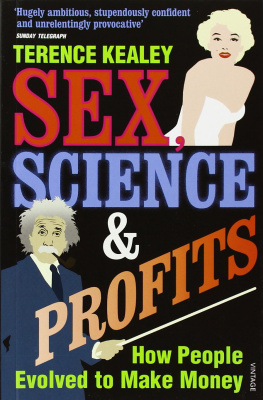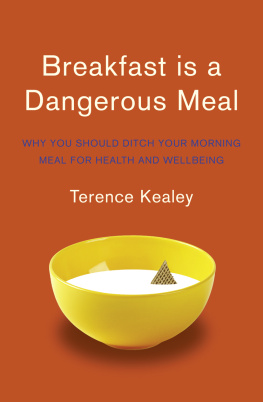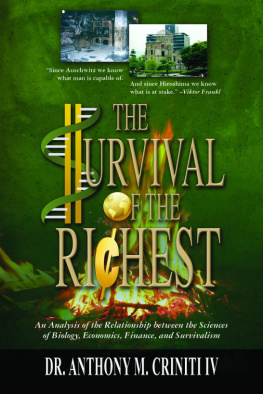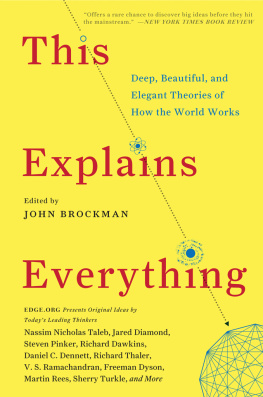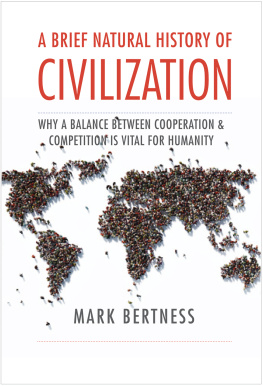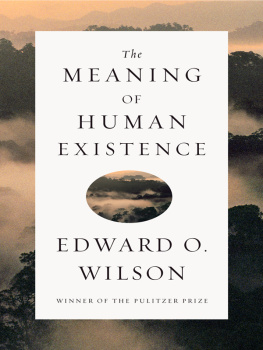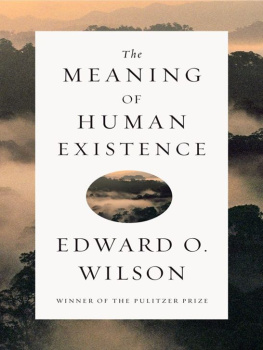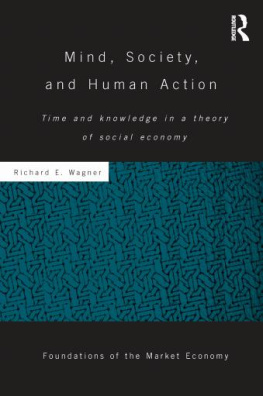TERENCE KEALEY
Sex, Science and
Profits
How People Evolved to Make Money

This eBook is copyright material and must not be copied, reproduced, transferred, distributed, leased, licensed or publicly performed or used in any way except as specifically permitted in writing by the publishers, as allowed under the terms and conditions under which it was purchased or as strictly permitted by applicable copyright law. Any unauthorised distribution or use of this text may be a direct infringement of the authors and publishers rights and those responsible may be liable in law accordingly.
Version 1.0
Epub ISBN 9781446400470
www.randomhouse.co.uk
Published by Vintage 2009
2 4 6 8 10 9 7 5 3 1
Copyright Terence Kealey 2008
Terence Kealey has asserted his right under the Copyright, Designs
and Patents Act 1988 to be identified as the author of this work
This book is sold subject to the condition that it shall not, by way of trade or otherwise, be lent, resold, hired out, or otherwise circulated without the publishers prior consent in any form of binding or cover other than that in which it is published and without a similar condition, including this condition, being imposed on the subsequent purchaser
First published in Great Britain in 2008 by William Heinemann
Vintage
Random House, 20 Vauxhall Bridge Road,
London SW1V 2SA
www.vintage-books.co.uk
Addresses for companies within The Random House Group Limited can be found at: www.randomhouse.co.uk/offices.htm
The Random House Group Limited Reg. No. 954009
A CIP catalogue record for this book is available from the British Library
ISBN 9780099281931
The Random House Group Limited supports The Forest Stewardship Council (FSC), the leading international forest certification organisation. All our titles that are printed on Greenpeace approved FSC certified paper carry the FSC logo. Our paper procurement policy can be found at:
www.rbooks.co.uk/environment
Printed and bound in Great Britain by
CPI Bookmarque, Croydon CR0 4TD
Contents
For Felicity Bryan, my agent, without
whom this book would not have been finished
SEX, SCIENCE AND PROFITS
Terence Kealey is a clinical biochemist and Vice-Chancellor of the University of Buckingham. He is author of The Economic Laws of Scientific Research and writes regularly for The Times and the Sunday Telegraph.
ALSO BY TERENCE KEALEY
The Economic Laws of Scientific Research
Prologue
I
The Prophet of Progress
Knowledge is power. Francis Bacon, Religious Meditatations, Of
Heresies, 1597
The concept of progress is surprisingly recent. The idea is only 400 years old. It was formulated in 1605 by an Englishman, Sir Francis Bacon (15611626), in his book The Advancement of Learning. Before Bacon, people had supposed history to be circular, not directional, and both Plato and Aristotle had asserted that history was cyclical, with republics and kingdoms replacing each other to no outcome. As Ecclesiastes 1:9 says, there is no new thing under the sun.
In his 1920 book The Idea of Progress J. B. Bury, the Cambridge historian, noted that an ancient expression of improvement had in fact been made in Daniel 12:4: many shall run to and fro, and knowledge shall be increased but that verse was overlooked for millennia by people who did not understand it: how could knowledge be increased when it had already been revealed by God? Democritus had hinted at the notion of progress during the fourth century BC , as had the Oxford scientist Roger Bacon during the fourteenth century AD, but only with Sir Francis Bacon was the concept described. He called it progression, the addition of new knowledge to old.
Bacon came to the idea of progress in 1588, when the Spanish launched the Armada against England. Though England, helped by the weather and the Dutch, beat off the Armada, Bacon never forgot the fear. Indeed, Bacons future secretary, the philosopher Thomas Hobbes, was born prematurely after his mother was shocked into labour on learning of the sighting of the Armada. And Mrs Hobbes was right to have been shocked: by 1588 the king of Spain was a man of vast power, who not only ruled significant parts of Europe (Portugal, the Low Countries, much of Italy, parts of Burgundy and so on) but who also straddled the globe, from Macau and the Philippines in the east to Mexico and Peru in the west. Indeed, he so girdled the world that the Philippines in the east were administered from Mexico in the west. He might easily have added England to Spains list of conquests.
Bacon wanted to know how Spain had become so powerful. So he read the histories, including Gomes Eannes de Azuraras The Chronicle of the Discovery and Conquest of Guinea (1450), Joo de Barross Dcadas da sia (155263) and Antonio Galvanos Summary of the Discoveries of the World (1555), and he concluded that Spain had created its empire by technology: and like as the West Indies had never been discovered if the use of the mariners needle had not been first discovered. In 1620 Bacon wrote: Printing, gunpowder and the magnet [compass]... have changed the whole face and state of things throughout the world. In his most famous quote, he said: Knowledge is power.
But who had created Spains technology, knowledge and power? From his readings of the chroniclers Bacon concluded that the hero of the story was not a Spaniard but a Portuguese, Prince Henry the Navigator. It was Henry who had launched the modern world of progress. How?
II
For God and Profit
He that increaseth knowledge increaseth sorrow. Ecclesiastes 1:18
There are two major reasons for doing science: to discover something new for its own sake or to discover something new for the sake of making money. On either score Henry the Navigator (13941460) can claim to have been one of the worlds greatest scientists. Before him, people subscribed to a false cosmography and Portugal, his country, was poor. By the time his work was complete the Europeans had transformed world geography and Portugal was one of the richest countries on earth.
Henry was the third son of Joo (John) I, king of Portugal, and of Philippa, his queen. Philippa was the daughter of John of Gaunt, so Henry was half-Portuguese and half-English. But Portugal, when Henry was born, was a precarious little nation. For hundreds of years it had been ruled by Muslims from North Africa, and they had been expelled by the native Christians only the century before Henry was born.
Portugal was poor because it was excluded from the centres of international trade. The rich states of Europe were then the trading city-states, like Bruges, and the wealthy states were the ports of the Italian peninsula, including Venice and Genoa, which traded the spices, silks and gems of India, China and the islands of the East. Those trades were as old as European civilization itself: and, behold, a company of Ishmealites [Arabs] came from Gilead with their camels bearing spicery and balm and myrrh, going to carry it down to Egypt. (Genesis 37: 25).
The spices would be re-exported from Egypt to Europe, whose people have always salivated over the peppers and gingers and cinnamons and saffrons and asafoetida and cardamoms and cloves of Persia, India, Malaysia and Indonesia (pepper and ginger are Indian loan words). The spice trade was, therefore, one of the most lucrative trades of the day, and the people who controlled it grew rich. Yet those lucky people were not the consumers in Europe, nor the producers in Africa and Asia, but the intermediaries, who were primarily the Muslim merchants of North Africa and the Middle East.
Next page
